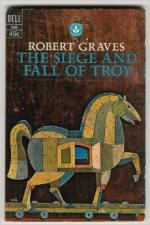|
This section contains 186 words (approx. 1 page at 300 words per page) |

|
Although Graves retells the Iliad and the Odyssey, he chooses to ignore many of the conventions that govern those epics. In these epics, Homer had a narrowly focused view of his subjects. The Iliad, for example, is the story of the anger of Achilles, not that of the Trojan War. Readers must look elsewhere to learn about such things as the judgment of Paris, the Trojan horse, and Achilles' death. Graves worked from a large body of classical literature, assembling pieces of the legend and myth to suit the purposes of his story. Graves's stated purpose was "to make the whole story, from the foundation of Troy to the return of the victorious Greeks, into a single short book for boys and girls." The result is a fast-paced, comprehensive account, n in a succinct, direct style, with many characterizations that deviate from Homer's portrayals.
Graves had...
|
This section contains 186 words (approx. 1 page at 300 words per page) |

|




